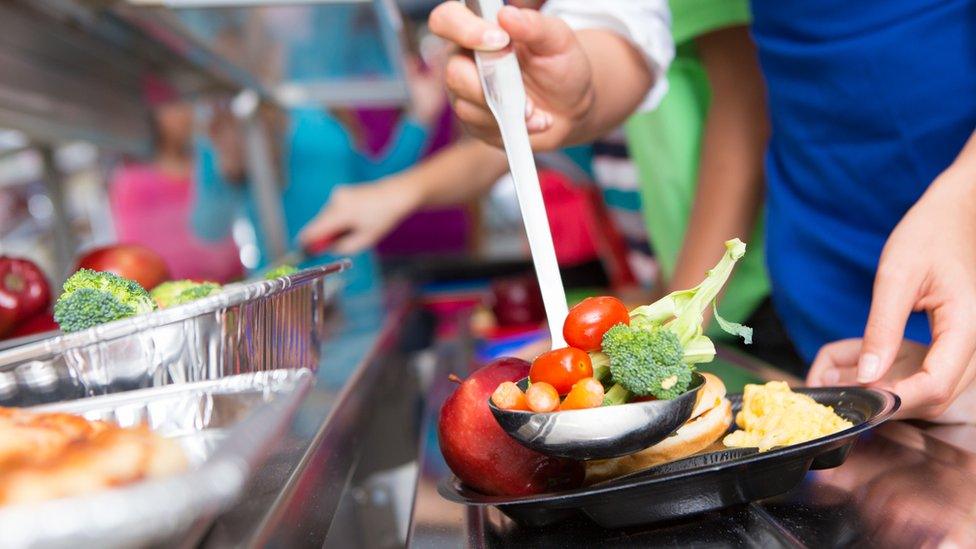Watchdog in 'holiday hunger' action call
- Published

More action is needed to make sure children from low income families don't go hungry over the holidays, according to a report.
The Poverty and Inequality Commission is calling for a cash benefit to be introduced across Scotland.
Many councils now run schemes to provide free meals to children during school holidays. However, the provision varies from area to area.
Anti-poverty campaigners have long been concerned that free school meals are, in effect, a benefit which is only available for part of the year.
They have warned that during school holidays some children could go hungry - or some parents could go without so their children are well fed.
The commission was asked by the Scottish government to look at how poverty might be tackled. However, it is independent of government.
Their report proposes paying a benefit during school holidays which would be, at least, equivalent to the cost of school meals.
The argument is that a benefit would help ensure greater consistency across Scotland and ensure that those who do not want to take part in the current schemes do not lose out.
Poverty and Inequality Commission chairman Douglas Hamilton said: "School holidays make up a quarter of the year, so it is no surprise that they can create significant pressures for Scotland's poorest families around finances, food, opportunities for play, social isolation and parenting.
"The holidays bring additional costs and challenges to already hard-pressed families, particularly over the six-week summer break and at Christmas."
Council provision
Free school meals are seen as a vital benefit for the rest of the year but are, in effect, withdrawn during school holidays at a time when families face the most financial pressures.
Many councils - often in the areas where there is the greatest concern about the effect of child poverty - now have so-called "holiday hunger" schemes.
Some provide meals at events and activities put on for school pupils during the holidays.
These are paid for by the councils themselves.

North Lanarkshire Council recently became the first in the UK to start offering free meals to eligible children 365 days a year.
Members of the commission visited a number of these schemes this year to find out more.
The report argues that there is a need for a more co-ordination and consistency across Scotland.
It suggests:
The Scottish government, council body Cosla and individual local authorities should work together to take a strategic approach to developing and funding a coordinated package of school holiday support
Building from existing services and holiday club provision to ensure "nutritious and culturally appropriate food" is available for all children from low income families
Their report says: "The Scottish government should also look at introducing additional cash benefits during holiday periods for those who are eligible for the school clothing grant.
"Existing mechanisms, such as the school clothing grant, should be considered as a way of delivering this.
"Financial transfers may be particularly important for families with older children who are not eligible, or do not wish, to attend many of the holiday programmes on offer. The amount should be set at a level that at least matches the equivalent costs of school meals and consideration should be given to how much payments should be and when they should be provided."
Setting benefits
The report does not indicate what the overall cost of such a benefit might be or the exact level it should be set at.
It calls on the government to identify someone to take a role co-ordinating policy relating to school holidays.
It also urges local authorities to take responsibility for the strategic co-ordination of action around school holidays in their area, and of holiday club provision in particular.
Local government organisation Cosla is in discussions with the Scottish government on how they can work together to help those on low incomes during the holidays and outside school hours.
Councillor Stephen McCabe, Cosla Children and Young People spokesman, said: "In general terms local authorities work closely with their partners to address child poverty. Their work is often bold and innovative and there is an increasing understanding of what works.
"There is increasing support for those on the lowest incomes with more local authorities involved in cost of the school day initiatives.
"We know from our own data that the vast majority of local authorities provide some form of out of school hours provision for children and young people experiencing poverty."
He added: "Whilst food is a part of this it is also focussed on activities and parental support and involvement. This is work that is funded largely by local authorities themselves at a time where there are significant budget pressures on essential services."
Pressures on families
Charities working in the field have stressed the need for urgent action.
Child Poverty Action Group director John Dickie said: "We know from our work that families face a range of extra pressures and costs during the school holidays around food, childcare and accessing fun and rewarding holidays activities. The result is that for to many children and parents holidays are time of extra stress, rather than of fun new opportunities.
"Lack of an adequate income is the fundamental driver of those additional pressures so it is right that further boosting family incomes has to be at the heart of any approach to supporting families during school holidays, alongside a joined up approach to reducing the costs of childcare and holiday activities.
"We very much welcome the Scottish government's existing commitment to an income supplement, but families can't wait until 2022 and new ideas on boosting financial support for families now can only be welcome."
A Scottish government spokesperson said: "We thank the Commission for its detailed report and will give careful consideration to its findings.
"UK government welfare cuts are having an adverse impact on many families and we are investing over £125m this year to mitigate against these impacts and protect those on low incomes.
"Our Fair Food Fund also promotes dignified solutions to food insecurity, and we have already committed to increasing this to £3.5m next year - £2m of which will be focused on the school holidays.
"In addition, local authorities also have the flexibility to provide meals to children out-with term time and some chose to use this flexibility during school holidays by providing holiday lunch clubs."
There are previous examples of the Scottish government and councils working together to try to support low income families.
Recently, the minimum level of school clothing grants was standardised to help ensure greater consistency across the country although councils are free to offer additional support if they want to.